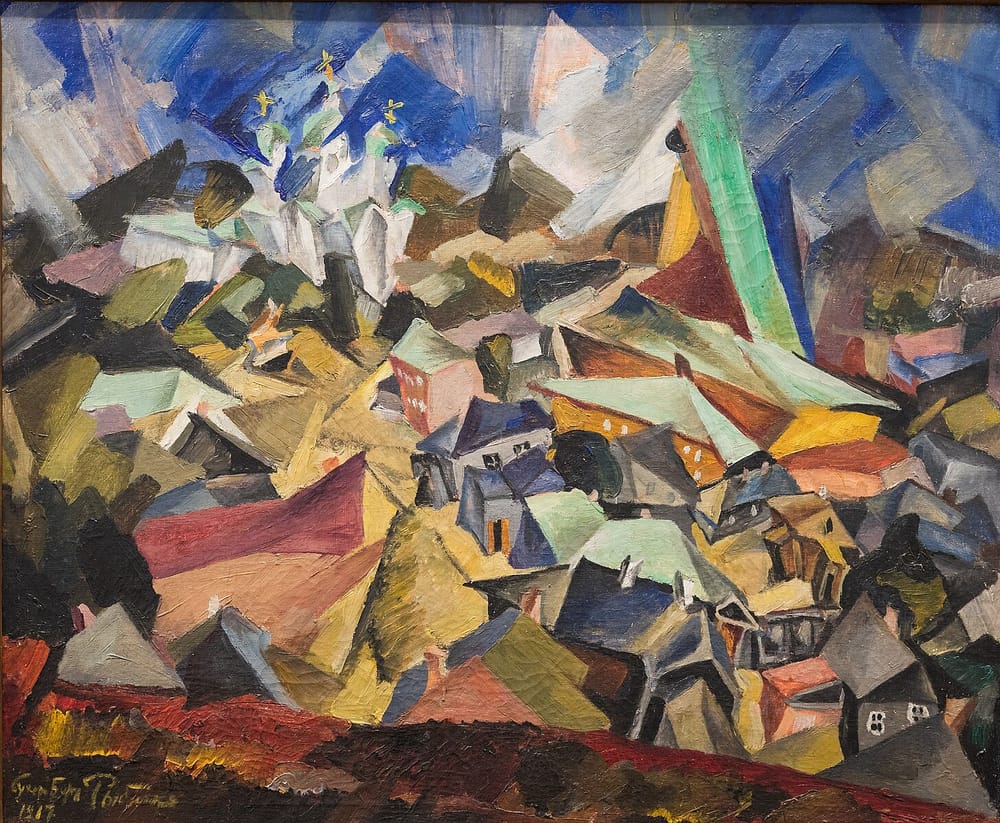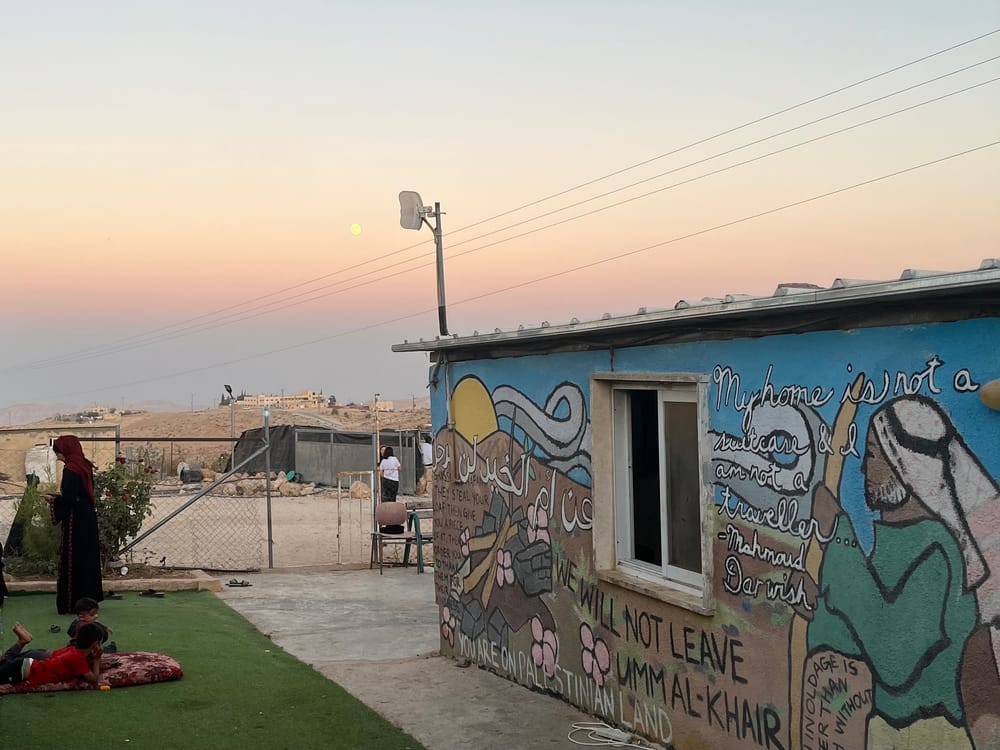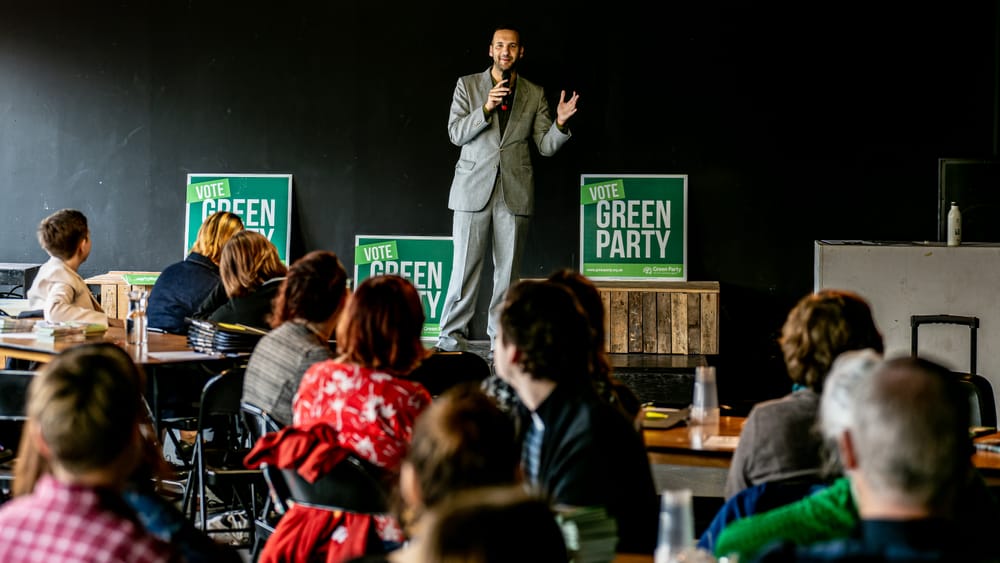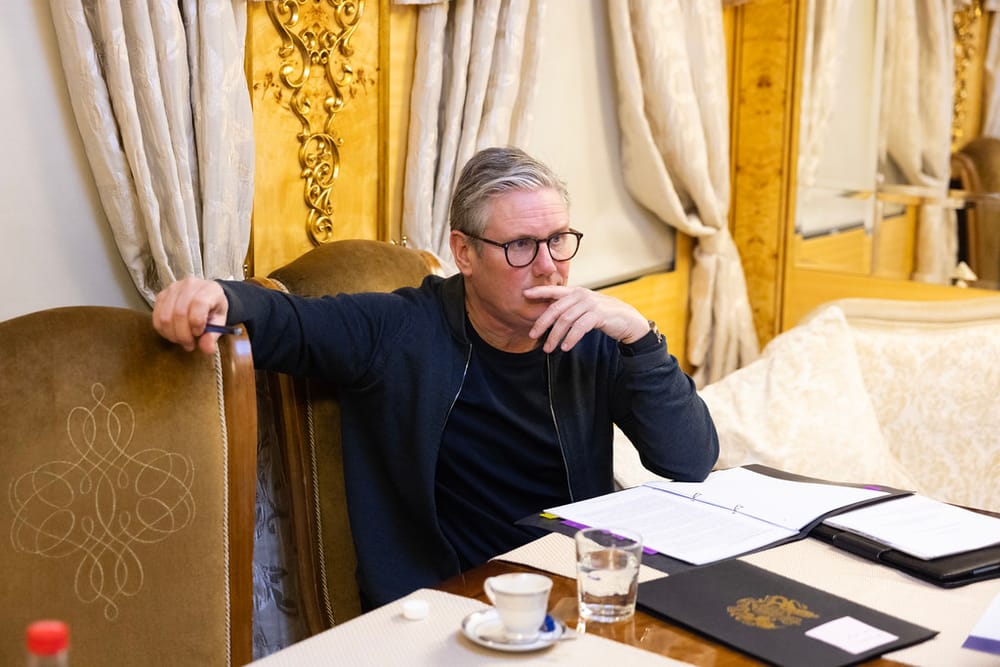Jazz hands and hollow gestures — watching a play is not political action
On the emptiness of art in the shadow of genocide.
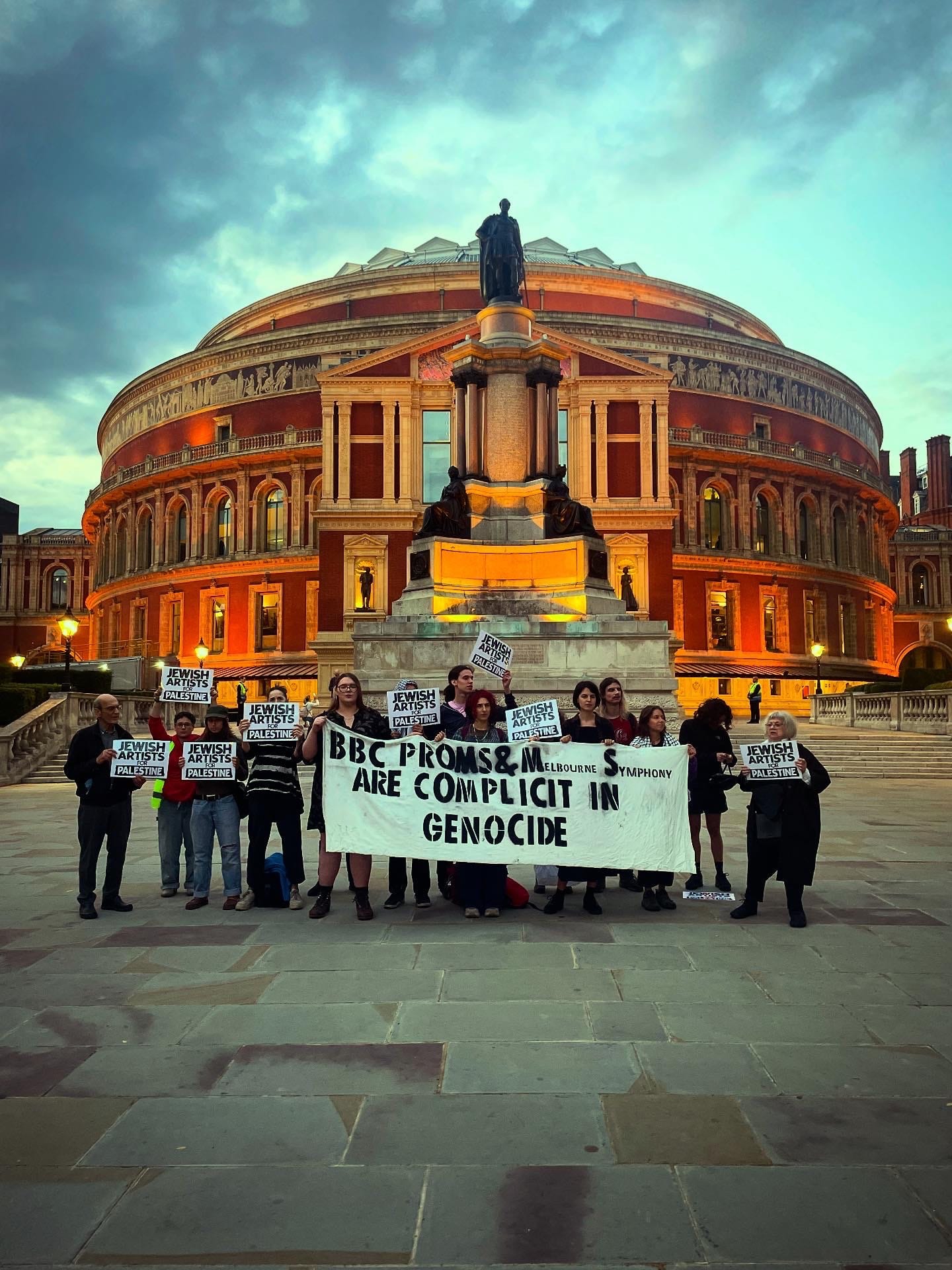
On stage, a man paces under a spotlight. His surroundings are dark, drawing our focus to an illuminated chair, a glass jar, and the man himself, barefoot amongst a pile of red flower petals. He is throwing these petals into the air, in the hope that his lost daughter will recognise their scent and find her way back to him. He is a Palestinian man, a flower seller, displaced in Rafah by the genocidal Israeli occupation. Except he isn’t; he’s an actor and this is fiction. No matter how convincing the performance, it remains a mere shadow of the actual horrors being unleashed upon Gaza, every second of every day.
In August, I attended the Edinburgh International Festival’s (EIF) staging of Cutting the Tightrope, a “collection of short plays [that] audaciously explores the power of the arts in today's world events, political resistance and displays of artistic freedom.” The authors of the plays – all anonymous – created the show in 2024 to protest Arts Council England’s censorial warning against grant recipients that any “overtly political or activist” statements could jeopardise their funding. The Council’s “guidance” was clearly meant to stifle artistic production about Israel’s genocide in Gaza, and Cutting the Tightrope’s goal is to bombastically refute the notion that art should – or even can – be anything but political.
After the show’s final performance, the actors took to the stage to protest the EIF’s ties to Scottish investment firm Baillie Gifford, which an Art Workers for Palestine Scotland open letter accused of investing “in companies directly complicit in the ongoing genocide in Gaza”. The AWPS open letter specifically flagged the firm’s investments in AeroVironment, a US-based defence contractor from which Israel reportedly requested 200 “suicide drones” in late October 2023, and Babcock International, a British multinational defence company which works with Israeli suppliers to fulfill its contracts with the UK Ministry of Defence. Both companies have seen their stock prices rise during Israel’s destruction of Gaza and fall after ceasefires.
Following this deviation from the script, the show transformed into a panel discussion, where one of the actors asked an EIF representative to speak to the festival’s continued relationship with the fund.
Clearly taken off guard, the festival rep began his response with a recognition of his deep concern about “events” unfolding in “Israel and Palestine”, before pivoting to a condescending reproach of the Cutting the Tightrope company. If the EIF was so bad, then why had the festival staged this production in the first place? If the actors really cared so much about the funding situation, then why did they choose to perform? As for me, all I could think to ask while sitting in Scotland, watching an artifice of death paid for by the ongoing murder of the real people behind the production’s storytelling, was: what the fuck are we doing?
The ethics of cultural production
In the months since my trip to Edinburgh, a new film has launched a public conversation about the role of cultural production during a genocide. Last week, Tunisian filmmaker Kaouther Ben Hania’s latest project, The Voice of Hind Rajab, arrived at the London Film Festival. The film received widespread acclaim after its world premiere in Venice, and the support of celebrity producers added to its high profile heading into London. The film depicts the Palestinian Red Crescent Society’s phone conversation with six-year-old Hind, who was fleeing Gaza City with five family members when the Israeli occupation forces attacked their vehicle, ultimately murdering everyone in the car, along with two emergency responders, Yusuf al-Zeino and Ahmed al-Madhoun.
Queried in an interview about the ethics of the film, director Ben Hania responded frankly: “When you amplify the voices of Palestinians, you are personally accused of being exploitative – it’s another way to silence you. I have nothing to answer to this.”
Indeed, in a world where England’s national agency for arts and culture is actively participating in a global wave of anti-Palestinian censorship, Ben Hania’s perspective is certainly understandable. Yet, something still feels wrong – with the film, but also with the play, the books, the galleries, and the concerts.
In a recent piece for Dazed, Palestinian actor Motaz Malhees, one of the leads of the film, speaks directly to this discomfort by questioning the broader purpose of art as Israel carries out a genocide against his people. He asks: “Why be an artist if I’m not going to talk about stories like this?” This question gets to the heart of the twin feelings of disgust I’ve harboured towards all cultural production over the past two years, including my own. It feels disgusting to write about the genocide while it rages on. It feels more disgusting to write about anything else.
Ultimately, my intention is not to criticise the cast of the play or the production team behind the film or any of the other artists who have fallen on the side of creating, when all creation feels insufficient at best and complicit at worst. My experience in Edinburgh underscores that this is the wrong lens through which to interrogate the ethics of cultural production. The truth is that it does not matter whether we write, dance, play, or sing, if we do not first purge our cultural, artistic, and academic institutions from the blood money coursing through them.
Hollow gestures
It is worth clearly stating that not all artistic and cultural production is equal in its perspective and purpose. Specifically, the proliferation of media from non-Palestinian (and all-too often, anti-Zionist Jewish) voices in the shadow of the genocide is unsettling. I defer to a 2024 tweet from Amany Khalifa: “I’m disgusted by every person who has capitalized on the annihilation of our people in Gaza to advance their careers. None of you are important, nor are your webinars, articles, or films; it’s insane!! How has nothing changed in the face of all this killing..how?!!!”
Over a year later, these words seem even more prescient. The public conversation on Palestine has noticeably shifted, and in spaces where it was once unthinkable that one would hear the words “genocide” or “ceasefire now”, it has become commonplace. This is of course a good thing, but I can’t help but feel sick to my stomach when celebrities who have previously turned a blind eye to an extremely public and well-documented genocide have chosen this moment to speak up. It is much easier for artistic and cultural institutions to platform work about Palestine now, when they are less likely to face consequences for doing so.
In this changing climate, some cultural spaces have turned to empty gestures of solidarity, designed to alleviate the consciences of organisers and make attendees feel that they’ve chosen a principled location to spend their money. For the past two years, festival-goers at Barcelona’s Primavera Sound have passed installations meant to call attention to the genocide in Gaza on their way inside the festival’s gates. In 2024, this installation was the Gaza Mirror, which placed the Sagrada Familia and other Barcelona landmarks amidst the devastation in Gaza. In 2025, the Unsilence Gaza exhibit featured an immersive sound tunnel, meant to replicate the soundscape of bombings. These attempts at platforming Palestine within the cultural space of a massive, multi-million euro musical event come across as grotesque and devoid of any material meaning. Meanwhile, the illusion of the festival-as-political obscures the role of dominant cultural production in sanitising the demands of Palestinian liberation.
For an example of this function of cultural institutions, look no further than the Venice film festival, the location of The Voice of Hind Rajab’s premiere. In the run-up to the festival, Italian and international filmmakers within the collective Venice4Palestine sent a letter to the festival’s organisers, demanding that they condemn the ongoing genocide and rescind invitations to well-known Zionists, Gal Gadot and Gerard Butler. The Biennale’s response posited Ben Hania’s film about Hind as evidence of their openness to “dialogue”. In the same breath, the organisers made sure to mention that the festival’s 2024 line-up included a film about October 7th. Clearly, the organisers of the Venice film festival think there is a conversation worth having, one with two equal sides, both deserving of platforms. Hence the broader issue at play: for every Bob Vylan, there is also a Coldplay, and audiences should not be coddled into thinking that attending a show is solidarity work. Watching a play is not political action.
Follow the money
Even when the art in question is beyond political reproach, the reality remains that financial ties to Israel in the arts and culture sector run deep. The BDS movement’s cultural boycott specifically targets this truth, calling upon “international venues and festivals [. . .] to reject funding and any form of sponsorship from the Israeli government or complicit entities.” Therefore, when international festivals with unscrupulous financial backers decide to platform pro-Palestine protest art, it certainly reeks of reputation-laundering and art-washing.
The underground music scene has been a particular flashpoint for this type of obfuscation. In June 2024, U.S. private equity firm KKR bought Superstruct, a global live entertainment company responsible for producing UK festivals like Field Day and Mighty Hoopla, along with Barcelona’s Sónar. In January 2025, Superstruct bought international electronic music powerhouse, Boiler Room. KKR reportedly has a “structural and long-term” relationship with Israel, including massive investments in Israeli cybersecurity, the global arms trade, and illegal Israeli settlements in the occupied West Bank. The aforementioned festivals have all put out statements distancing themselves from KKR, but that has not stopped vocally pro-Palestinian artists from pulling out of Superstruct-owned events.
Before KKR bought Superstruct, many of the artists currently boycotting these festivals, such as Arca and Sama’ Abdulhadi, performed on their stages. In 2018, Boiler Room hosted an event in Palestine, and when the genocide began in 2023, it relaunched a Palestine charity t-shirt with the statement: “for many years, Boiler Room has stood in solidarity with Palestinians living under occupation. Today we continue this support by joining in the call for an immediate ceasefire and for the Palestinian people’s right to exist.” The roots of underground music in Black and queer culture make it an inherently political space, but the music cannot speak for itself. When the ticket revenue from the rave ultimately fattens the wallets of war criminals, the party needs to end.
Action over art
While filmmakers, actors, musicians, and academics give standing ovations to depictions of genocide, the horrors in Gaza continue. Even under the recently announced ceasefire, Israel continues to murder Palestinians in Gaza and the West Bank with impunity. As Hamdan Ballal Al-Huraini wrote for Vashti after his film No Other Land won an Academy Award: “Yes, we have an Oscar – but where is international law, which was established to protect civilians and innocents? We have received every accolade – but we want your conscience.” I’d go a step further – we must offer more than conscience, we must offer action.
The week after my trip to Edinburgh, a collective of Jewish artists disrupted the Melbourne Symphony Orchestra’s performance to protest the orchestra’s acceptance of funding from the genocide-peddling Gandel Foundation. In early 2024, Ravers for Palestine started hosting a strike fund to provide financial support to DJs who participate in the boycott of complicit music festivals and clubs. Art Workers for Palestine Scotland (a collective that includes many of the cast members from Cutting the Tightrope) is campaigning for a full endorsement of the Palestinian Campaign for the Academic and Cultural Boycott of Israel (PACBI) across Scotland, resulting in almost 200 committed organisations. Energy Embargo for Palestine continues to target the British Museum for its sponsorship deal with BP, a company complicit in both ecocide and genocide.
These organisers are heeding the July 2025 call from PACBI for “artists, academics, cultural workers, students, writers, athletes, and sportsplayers” to escalate their actions for Gaza. This call explicitly renounces the use of art in whitewashing Israeli crimes. PACBI provides an alternative and far more urgent method for artists and cultural workers to oppose the Israeli genocide. Instead of speaking out from within the confines of cultural production, we need to stop our production. What this political duty means for us as journalists and the entire media sector is a difficult negotiation. But one thing is for certain – there should be no business-as-usual during a genocide. And when culture is business, our charge is clear.▼
Correction: The article has been updated to clarify which companies Baillie Gifford invests in, the specific accusations by Art Workers for Palestine Scotland and the cast of Cutting the Tightrope, and the activities of the Baillie Gifford-invested defence firms, AeroVironment and Babcock International, as they relate to Israel. Baillie Gifford did not respond to a request for comment about its investments in these firms.
Author

Kendall Gardner is an editor at Vashti and a doctoral candidate in political theory at the University of Oxford.
Sign up for The Pickle and New, From Vashti.
Stay up to date with Vashti.
